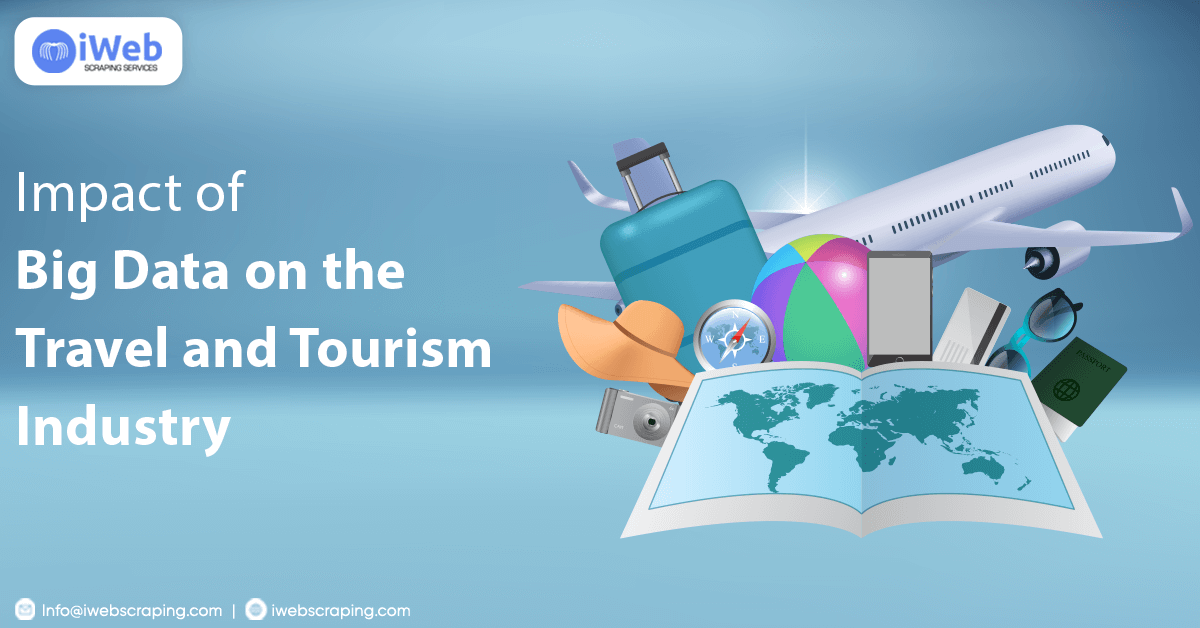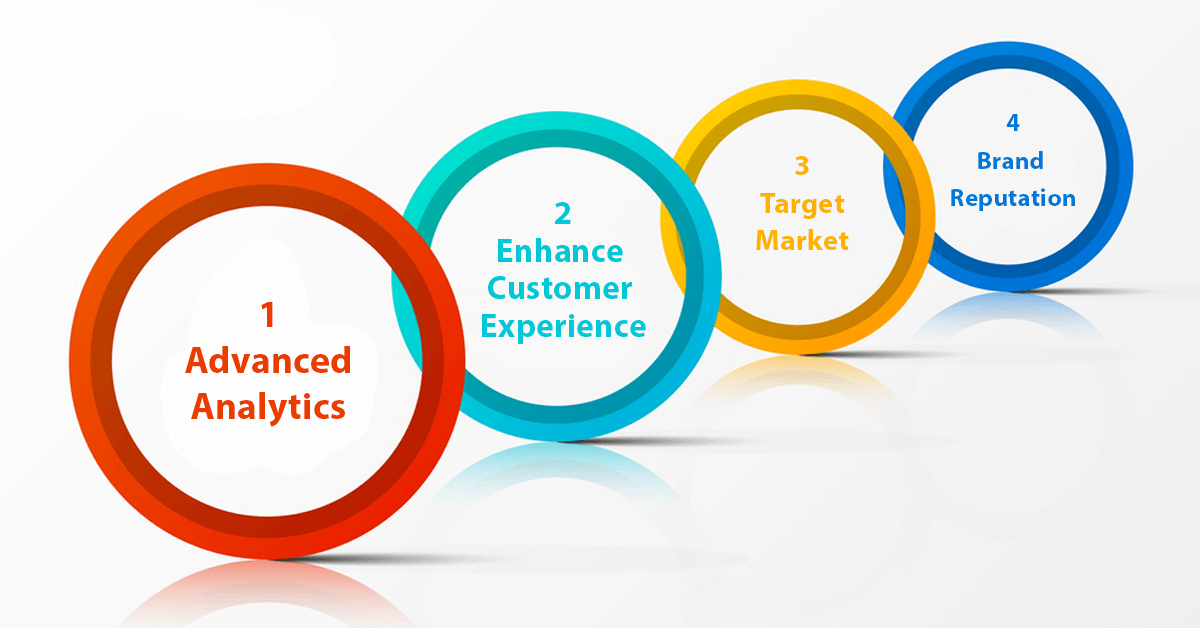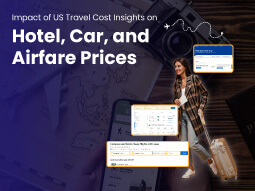Impact of Big Data on the Travel and Tourism Industry

Big data has reformed top-notch industries through innovative technologies. Big data has 3Vs, which stands for variety, velocity and volume. The travel and tourism industry has benefited from big data.
Long-term economic growth increases population wealth. The use of big data has taken businesses to the next level. It involves valuable insights to refine marketing, advertising and promotion. Big data includes customer databases, documents, emails, and mobile apps. The value depends not on quantity but on datasets.
Travel market research showcases the target market to users. It helps businesses identify the target audience, demographics and behavioural patterns. This blog explores the big data reformation of the travel and tourism industry.
Big Data in the Travel and Tourism Industry

Travel market research includes online surveys, intercept surveys, and focus groups. Big data drives the industry to the next level through different strategies. It is clear why travel data is significant for the travel industry. A data-driven strategy will make a big difference in the company’s performance. The travel industry uses travel data analytics, but few struggle with data silos. It prevents them from achieving the most value from data. Understanding data’s value requires dismantling data silos.
Big data is a compilation of data from different companies. It reflects the scales, customers, competitors, and market with related activities. The impact of Big Data in the travel industry is enormous as it generates tons of data. Travel Intelligence plays a crucial role in gathering, analyzing, and applying information to enhance the travel experience. It aids in mitigating risks, enhancing security measures, and offering timely information in terms of security.
The travel industry has enhanced various aspects of operations through big data. Big data analytics are employed to detect and prevent fraud in businesses. Big data is an integral part of the tourism industry with immense opportunities. With the advancement of technology, the role of big data is likely to be more profound. Real-time analytics enhances decision-making and drives innovation. Aspects like sophisticated algorithms and predictive prices are always helpful.
How Big Data is Improving the Travel and Tourism Industry?

The travel industry is the most beneficial business niche in the world. Many countries have improved their economies and GDPs through tourism. Some prominent players are Airbnb, TripAdvisor and Booking.com, which enhanced their service through big data. However, data collection has some prominent challenges.
Companies are accountable for creating a privacy framework to handle volume, value, velocity and variety of big data. They strive to decrease risk and protect confidential details while ensuring growth. Big data has made a lasting impact on the travel industry, and it will continue for years. Technological innovations have shaped the future, and big data aims to transform the market for informed decisions. Travel brands must consider how big data can be used for personalized experiences and, in turn, increase profitability.
Key Benefits of Big Data in the Travel Industry

The following are the key benefits of big data in the travel industry:
Advanced Analytics
Businesses opt for a large volume of data through big data to gain new insights. It helps to be more efficient in predicting the change in trends. Hotels and Airlines can gather information about main competitors. This is the reason why big data is more efficient in predicting the change in trends.
Enhance Customer Experience
Businesses dive into big data to meet the needs of their target audience. A thorough analysis helps to meet the needs before becoming their pain points. In this way, businesses provide recommendations and a better experience for individual preferences.
Target Market
Regular communication interaction in the travel industry allows companies to understand changing trends. Travel and tourism industry uses predictive analytics for data-driven decisions to increase efficiencies. Not only does it enhance customer experience, but it also improves the efficiency of ad campaigns. A good strategy in marketing helps businesses to understand better.
Brand Reputation
Tourist destinations depend on the image if they are to stay in business. Big data ensures all customer data is examined and analyzed, fulfilling future client needs. For example, the Taj Hotel is a top-notch choice for classy customers for outstanding hospitality. It relies heavily on customer feedback mined from a myriad of big data.
Main Challenges of Big Data
Data privacy and security are the two top concerns in big data. Companies are accountable for creating a privacy framework to handle volume, value, velocity and variety of big data. They strive to decrease risk and protect confidential details while ensuring growth. A study by Informatica explains that working with immense volumes of information spread across different locations is a threat. We must develop strong privacy frameworks to handle big data efficiently.
Data has limits, especially when it comes to personalization. Companies must balance it to avoid violation of customer privacy. Fetching data in real-time might be challenging for businesses. Frequent checking and validation of data are effective ways to maintain quality. Addressing challenges requires combining technology, data management strategies and organizational commitment.
Case Studies
Travel might be stressful sometimes, and data analytics helps to gain real-time insights to make strategic decisions. The following are a few examples of the effective use of big data by some popular brands:
Marriott Hotel
Marriott Hotels has used big data technologies across its business operations. Both unstructured and semi-structured datasets determine the value of each room. The industry caters to millions of travelers daily and checks in with different levels. Marriott uses hotel data analytics to drive revenue growth and enhance customer loyalty. Marriott has transferred a significant aspect of IT structure and application to IBM.
UBER EATS
UberEats is an American food ordering platform and is popular across the globe. The operation lies in the core of big data technology. UberEats strives for consistent innovation, offering improved experiences for earners, riders and eaters. UberEats operations include trips, billing and health of infrastructure behind the app.
McDonald’s
McDonald’s stays ahead of its competition because of enhanced Data Analytics. Data enables us to predict large orders for a positive customer approach. The app helps track customer data, leading to new orders and exciting offers. The company uses data analytics to uncover patterns across the brand and product through social media and customer feedback.
Wrapping Up
The travel and tourism industry uses valuable insights from data gathering and uses it effectively.
Big data revolves around an unlimited set of data created, stored and visualized. It recognizes significant challenges and opportunities that deal with huge amounts of data and their fusion.
Therefore, big data is more about challenges and steps that are being taken to overcome them.
Discover invaluable insight on iweb scraping for data extraction and automation. Don’t miss out and elevate the game of data analytics.




